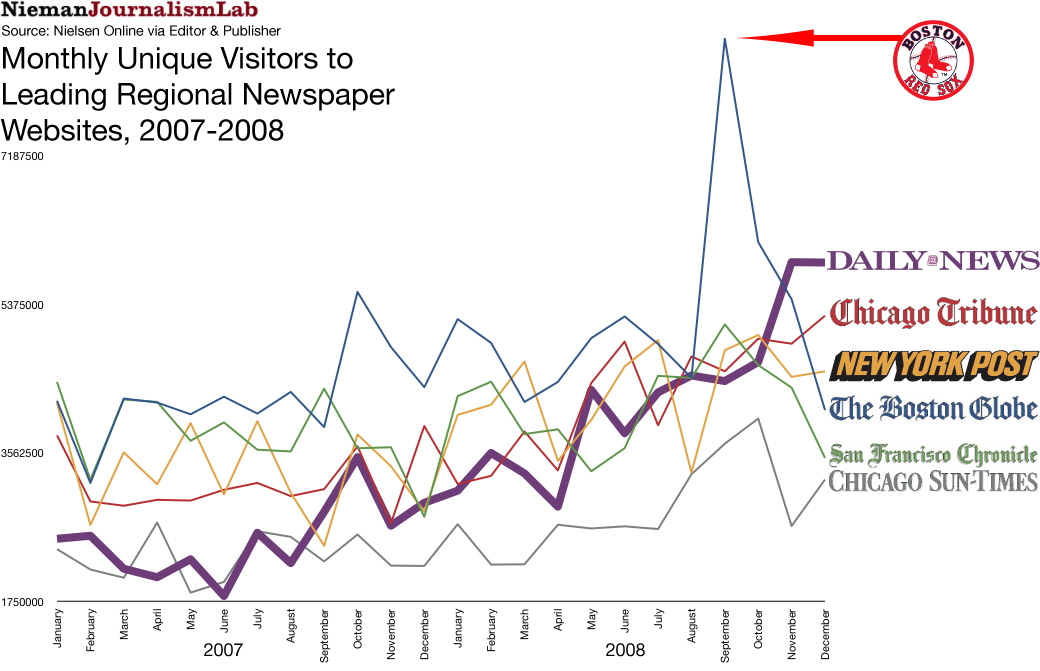The San Francisco Chronicle has been one of the newspaper industry’s great web successes. Its on line audience is among the largest in the country. By the end of the year, it could cease to exist. Just a reminder, this is not about figuring out how to get news delivery right on the web. The Chron has done that. It’s about figuring out how to make money by creating and then delivering news on the web.
Elephant Diaries: Why We Are Losing
h/t Nora
Seen on the bike
Over the last couple of days’ riding:
- A pair of crows harassing a hawk.
- Two guys up in a cherry-picker using a high-pressure hose to clean pigeon shit off of the Blakes Lotaburger sign.
- A couple of old hippies with a shopping cart. Asked us where we were going. “Up in the mountains,” we told them. “Stay vertical!” the girl said with a cheerful lilt in her voice.
- Snow by the side of the road, melting.
Water Vapor Feedback
Climate wonks with a key to get through Science’s gate should check out Andy Dessler’s excellent discussion in today’s issue of the water vapor feedback. For those who don’t, here’s the nut graph:
[A]lthough there continues to be some uncertainty about its exact magnitude, the water vapor feedback is virtually certain to be strongly positive, with most evidence supporting a magnitude of 1.5 to 2.0 W/m2/K, sufficient to roughly double the warming that would otherwise occur. To date, observational records are too short to pin down the exact size of the water vapor feedback in response to long-term warming from anthropogenic greenhouse gases. However, it seems unlikely that the water vapor feedback in response to long-term warming would behave differently from that observed in response to shorter-time scale climate variations. There remain many uncertainties in our simulations of the climate, but evidence for the water vapor feedback–and the large future climate warming it implies–is now strong.
Elephant Diaries: The Railroad Metaphor
There’s a cliche that keeps popping up in the discussion of newspapers’ futures that links the fate of my business today with railroads of old. Railroads, the argument goes, lost out to the trucking industry because they thought they were in the railroad business, rather than the transportation business. Newspapers, by analogy, are failing because they think they’re in the newspaper business, rather than the news business.
This graph, from Zachary Seward at Nieman, shows how wrong that argument is:

Regional newspaper circulation
Note the rising trend. By most any measure, newspapers are being enormously successful in attracting web readers. We all have huge audiences. Newspapers in general were among the earliest and most aggressive adopters of the Internet as a new means to deliver information to their customers. The problem is not the use of the web to deliver the news, but rather the revenue model that goes with it. Ad revenue has not followed.
Our mistake was to think we were in the news delivery business, rather than the ad delivery business.
Food Cheap
The global price of food is down 27 percent from a year ago, says the Economist. I’d link, but I’m typing this on my iPod.
More Will, Print Version
My employer was kind enough to publish my thoughts on George Will’s Sunday column for our print subscribers. (Sub/ad required for that, I think. Commens closed here, I set up an open thread over there.)
My 15 Minutes of Fame
Links to my work from Daily Kos and FiveThirtyEight in the same day. Barb raises the question of whether that’s 30 total minutes.
More Stuff I Wrote Elsewhere: Back on the Bird Beat
Birds Flee Changing Habitats (ad/sub req.):
Birds and butterflies offer the earliest signs that ecosystems are changing in response to a changing climate, according to Craig Allen, an ecologist with the U.S. Geological Survey.
“They’re mobile,” said Allen, an expert on the effect of climate change on New Mexico’s environment.
Climate has always changed, Allen said. The problem now is the speed at which the change is happening, he said. While birds and butterflies can pick up and move in response to changing temperatures, all the trees and grasses that make up an ecosystem cannot adapt so quickly to change, he said, and there is great uncertainty about what will happen as a result.
As New Mexico warms, Allen said, change “is going to happen in ways that we cannot predict.”
Stuff I Wrote Elsewhere, George Will Edition
The global cooling mole pops up its head again. Whack. (Comments closed here. If you’ve got something to say, do it there.)

